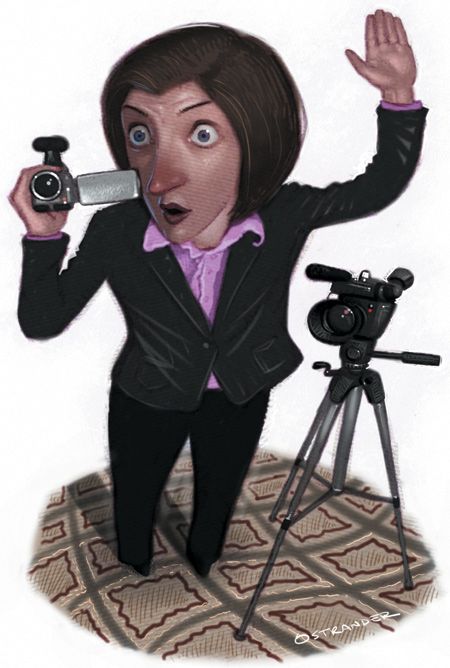Spotted at a veterinary symposium: The usual suspects
These hand-raisers, head-bobbers and other annoying specimens are impossible to miss at veterinary CE conferences.
Have you ever studied radiographs of a pork chop? That's right! One solitary pork chop that sat on an X-ray cassette to have its picture taken. I found myself doing this shortly after graduation from veterinary school when I was attending my first continuing education seminar. The subject was radiology and the speaker used the pork chop film to illustrate the radiographic appearance of fat, muscle and bone. Personally, I thought it was a ridiculous waste of time to go over material that any high school kid should know.

ILLUSTRATION BY RYAN OSTRANDER
The lecturer explained that it was necessary to review the basics so we'd have a working knowledge of the principles involved when we got to the practical part of the lecture. What happened—and what always seems to happen—is that the seminar ended before many of the important topics were covered.
Fast forward to present day. I recently returned from a two-day continuing education seminar put on by a prestigious veterinary school that shall remain unnamed. For those who'd like a hint, it's in Philadelphia.
The occasion brought back memories of that pork chop lecture and also gave me the opportunity to observe typical seminar occurrences. For example, have you ever noticed that no matter how long you've had a pen, it'll run out of ink while you're taking notes at a conference? Day after day it's been recording Tigger's temperature and detailed facts of every anal gland abscess. However, within 10 minutes of sitting down at a lecture, it begins to skip and then it dies. This usually happens shortly after you've loaned your spare to a person sitting three rows away.
There are also distinct personality types among lecture attendees. The guy next to me turned out to be a classic Head-Nodder (also known as a Swivel-Headed Beak Bobber). One or more of these can be spotted at any lecture, constantly nodding in agreement with the instructor and occasionally voicing their approval. They work very hard at letting everyone around them know they already understand all of the material and approve of the presentation. Frankly, the presence of this guy's undulating noggin in my peripheral vision was annoying.
Four rows in front of me there was a practitioner who exhibited Show-and-Tell Syndrome. Every now and then he'd wave his hand in the air and, upon being recognized, make statements like, "We saw a case like that in our hospital and treated it the way you described. It did fine." Who cares? This wacko's time-wasting is the type of thing that prolongs the pork chop phase of a talk and shortens the clinical application phase.
There was also a Detail-Stickler in the room. It was Clara Fye from Moot Point, Pa. Her hand flew up every few minutes so that each treatment regimen and dosage had to be repeated for her edification. Why she needed things repeated I'll never understand because she had not one but two video recorders running the entire time.
Lastly, I noticed that there are two types of people who leave early. Type one leaves shortly after the lecture begins. This can be a stray from another conference in the same building who suddenly realizes he's in the wrong room or a veterinarian who stays until the first coffee break then hits the road hoping to score CE credit without seeing the event through. The second type leaves near the end because of prior commitments. They hate to leave but since no lecture ends on time, they're forced to.
The last subject covered at the conference was immunology, a topic I've never understood. Most of what's known about it was discovered long after I went into practice. So when the immunology speaker began with a pork chop review, I was grateful. The new graduate in front of me turned around and said, "What a waste of time! This is material that any high school kid should know."
Dr. Michael Obenski owns Allentown Clinic for Cats in Allentown, Pa.